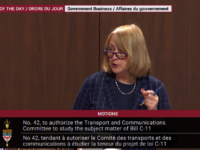The review of the Online Streaming Act (Bill C-11) heads to committee next week as the Standing Committee on Canadian Heritage plans to devote roughly 20 hours to hearing over the next two weeks. I have received an invitation and may appear as soon as next week. While the House of Commons committee study is just getting underway, the Senate has been debating the possibility of conducting a “pre-study” of the bill at its own committee. Pre-studies are somewhat unusual since they are conducted before the bill has formally been referred to the committee or, in the case of the Senate, even passed the House of Commons. In fact, Bill C-10, the predecessor to Bill C-11, started with a pre-study which ultimately undermined the overall committee study that many believed was inadequate.
Archive for May, 2022
CRTC Chair Confirms Bill C-11 Captures User Content, Will Take Years to Implement
CRTC Chair Ian Scott appeared before the Standing Committee on Canadian Heritage yesterday and Bill C-11 proved to be a popular topic of discussion. The exchanges got testy at times as Scott seemingly stepped outside of his role as an independent regulatory by regularly defending government legislation, even veering into commenting on newspapers, which clearly falls outside the CRTC’s jurisdiction. With respect to Bill C-11, most newsworthy were two comments regarding the regulation of user content and the timelines for implementing the bill if it receives royal assent.
Is There Anything Less Convincing than CRTC Chair Ian Scott’s Empty Assurances on Bill C-11 User Content Regulation?
The Online Streaming Act (Bill C-11) has now passed second reading in the House of Commons and will be the subject of hearings at the Standing Committee on Canadian Heritage in the coming weeks. With the prospect of user generated content regulation still a serious concern, outgoing CRTC Chair Ian Scott tried to provide assurances earlier this week that the Commission has no interest in exercising regulatory powers over user generated content. Yet Scott’s comments rang hollow as he twisted himself in a series of contradictory knots that lead to the inescapable conclusion that non-binding promises without actual reforms mean little.
Digging Into the Government’s Online News Act Claims, Part Two: This is “Minimal Market Intervention”?!
The government has started its defence of Bill C-18, the Online News Act, in the House of Commons with claims that it simply requires compensation for use of news content and adopts a “minimal market intervention” approach. My post yesterday focused on the use claims and this post digs into the bill to see just how minimalist it is. Canadian Heritage Minister Pablo Rodriguez promoted the bill as a market-oriented approach on the day the bill was tabled, leading to an interview with Vassy Kapelos in which she was visibly puzzled at the claim.
Setting aside the fact that many leading Canadian media organizations have already struck news deals with Google and Facebook without government intervention, here is a look at what the government thinks constitutes “minimal market intervention”:
Digging Into the Government’s Online News Act Claims, Part One: Compensation For “Use” of News Content
With the Online Streaming Act having passed second reading in the House of Commons and headed for further study at the Standing Committee on Canadian Heritage, the government moved swiftly to second reading debate on Bill C-18, the Online News Act. I’ve already written several posts expressing concern about the overbreadth of the bill and its implications. The House of Commons debate is just getting underway with the opening defence of the bill delivered by Chris Bittle, the Parliamentary Secretary for Canadian Heritage, presenting a vision of minimal intervention based on fairness:
The compensation that tech giants would provide to Canadian media through Bill C-18 would represent a giant step in ensuring the viability of strong and independent journalism in Canada, which is essential to our democracy. That is what Bill C-18 would do. It is simple. Tech giants would fairly compensate Canadian journalists when they use their content. That is it: no more, no less. It is a market-based solution that involves minimal government intervention, and I think everyone in this place can agree on that.
The government is relying on two claims here: fair compensation for the use of journalist content and a market-based approach with minimal government intervention. While there might indeed be support for a bill that did that, the Bill C-18 reality is far different. The bill extends well beyond compensation for use, stretching the meaning of “use” far beyond a reasonable standard and creating a level of intervention that simply cannot be fairly described as minimalist. This post examines the notion of fair compensation for Canadian journalists when their content is used with a post on “minimal” intervention to follow.











